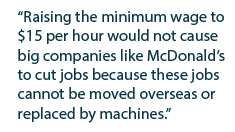Maximum importance of minimum wage
Minimum wage raise in Michigan has effects on Michigan teens
During a school week, senior Senaida Gonzalez works cashier at Mcdonald’s during her six and half hour shift, taking customers oders. Gonzalez has worked at MCdonald’s for almost 2 years. She thinks that the minimum wage should be replaced with a livable wage. “A lot of people are struggling to pay bills that are too much for what they make,” Gonzalez said.
 Money. It runs America. Everyone needs it to live. The need for money begins as a teen, hence making minimum wage an important discussion to students. The situation has some believing that minimum wage jobs are starting positions and the pay needs to stay low, with others believing that the pay needs to increase with time, as inflation rises. However, with Michigan’s new minimum wage raise on March 29, students will begin to see the truth of this debate.
Money. It runs America. Everyone needs it to live. The need for money begins as a teen, hence making minimum wage an important discussion to students. The situation has some believing that minimum wage jobs are starting positions and the pay needs to stay low, with others believing that the pay needs to increase with time, as inflation rises. However, with Michigan’s new minimum wage raise on March 29, students will begin to see the truth of this debate.
Minimum wage standards were set in the 30s. On October 24, 1938, the federal minimum wage act passed, and at the time was 25 cents. Since then, the federal minimum has raised, and is now $7.25 an hour. Michigan’s wage has risen above the federal requirement, standing at $9.45 an hour, raising the mandatory pay for Michigan by 25 cents.
This wage is not for everyone, despite the change.
Minors can only make 85% of minimum wage, meaning 16-17 year olds can earn $8.03 at the lowest. Tipped employees make even less, starting at about 39% of minimum wage, or $3.59 an hour.
However, this new minimum wage raise can help some students outside of just extra money.
In a poll of 66 students, the results were split exactly down the middle for job ownership. Out of the half that have jobs, 39% of them provide for their family with that job, using the money to help their family pay the bills and buy necessities.
Senior Senaida Gonzalez helped her parents once with some payments. “My parents were short on money, so I had to help them pay half of the bills of the month,” Gonzalez said. “I had to give them over $600.”
The 39% percent of teens who help support these bills are making an average of $9.34 an hour.

RAISE THE WAGE
The raising of minimum wage has multiple benefits besides extra spending money.
One of the first benefits of raising minimum wage would be lower government welfare spending. The Center for American Progress reported in 2014 that if the federal minimum wage was raised to $10.10, and that government spending on SNAP (Supplemental Nutrition Assistance Program) would decrease by $4.6 billion (6%). Raising the wage to $10.10 would shave $7.6 billion off annual government spending on income support programs, with 1.7 million Americans no longer dependent on government assistance programs.
Another benefit would be poverty reduction, which can have multiple benefits on the economy, such as lower high school dropout rates according to a study done by Health Impact Partners and lower crime rates as indicated in a study done by University of Virginia.
Minimum wage has not kept up with inflation. According to the U.S. Department of Labor, the minimum wage in 1968 was $1.60, which is equivalent to $11.16 in Jan. 2016 dollars. Compared to today’s federal minimum wage, $7.25, the minimum wage in 1968 was 53.9% higher. According to Inequality.org, if minimum wage had kept up with America’s overall income growth, it would be $21.16 per hour.
Raising minimum wage would also have positive effect on the federal deficit.
James K. Galbraith, PhD, Professor of Government at the University of Texas in Austin believes “Because payroll- and income-tax revenues would rise, the federal deficit would come down” as a result of the minimum wage
LOWER THE PAY
The minimum wage raise is not without negative consequence, in fact it has multiple counteractive consequences.
Raising minimum wage means more spending for businesses, smaller businesses seeing the biggest effects. The Congressional Budget Office predicted that raising the wage from $7.25 to $10.10 would result in the loss of over 500,000 jobs. It would also force some businesses to close, local mom and pop stores being threatened the most, with 60% of small business owners believing that raising minimum wage would hurt “most small business owners” in a 2013 poll.
This raise also affects big chains. The same workers asking for $15 could also be laid off according to White Castle vice president Jamie Richardson. The company would be forced to let go of thousands of workers and even have to close almost all of their stores.
The raise of minimum wage could also shut out teenagers and young adults from the minimum wage workforce.
According to the Pew Research Center, teenagers make up 24% of minimum wage workers. Casey B. Mulligan, PhD, economics professor at the University of Chicago, said that teenage employment index fell strongly (about 8% in 3 months, where as in 2008, the 8% drop took a year) after 2009s minimum wage increase. This happens because employers will not hire teenagers without qualifications.
Matthew Rousu, PhD, Associate Professor of Economics at Susquehanna University wrote in an article for Forbes how “this [minimum wage] law has a devastating impact on teenagers” because establishments will not pay young employees with limited or no experience or no established skills, like many young people.
In the new technological era, companies will replace workers with robots if they can not afford them. The Washington Post noted that restaurants are looking for “ingenious” ways to replace humans in the work scene, threatening almost 8.9 million food industry workers. According to Forbes, robots are replacing everything from cashiers to bartenders to delivery workers. Not only do these robots not require pay from the employers, they also do not need tips, or even communication. A higher minimum wage will only make these opportunities more sought out.









